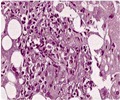Hospital pneumonia diagnoses are often uncertain, with more than half being revised upon further examination. This highlights the need for improved diagnostic accuracy.

Diagnostic Discordance, Uncertainty, and Treatment Ambiguity in Community-Acquired Pneumonia: A National Cohort Study of 115 U.S. Veterans Affairs Hospitals
Go to source). The study describing the new results published in Annals of Internal Medicine.
‘#Pneumonia diagnoses are all over the map! A third of patients who ended up with pneumonia weren't initially diagnosed, while nearly 40% of initial pneumonia diagnoses were changed. #infection’





Barbara Jones, MD, MSCI, pulmonary and critical care physician at University of Utah Health and the first author on the study, found the results by searching medical records from more than 100 VA medical centers across the country, using artificial intelligence-based tools to identify mismatches between initial diagnoses and diagnoses upon discharge from the hospital. More than ten percent of all such visits involved a pneumonia diagnosis, either when a patient entered the hospital, when they left, or both. What is Pneumonia?
Pneumonia is a serious lung infection that occurs when the air sacs fill with fluid or pus. This inflammation makes breathing difficult and can lead to a range of symptoms including fever, chills, cough, and shortness of breath. While it can affect anyone, certain groups, such as young children, older adults, and people with weakened immune systems, are at higher risk. The condition can be caused by various pathogens, including bacteria, viruses, and fungi, and its severity can range from mild to life-threatening.“Pneumonia can seem like a clear-cut diagnosis,” Jones says, “but there is actually quite a bit of overlap with other diagnoses that can mimic pneumonia.”
The study also found that this uncertainty was often evident in doctors’ notes on patient visits; clinical notes on pneumonia diagnoses in the emergency department expressed uncertainty more than half the time (58%), and notes on diagnosis at discharge expressed uncertainty almost half the time (48%). Simultaneous treatments for multiple potential diagnoses were also common.
When the initial diagnosis was pneumonia, but the discharge diagnosis was different, patients tended to receive a greater number of treatments in the hospital, but didn’t do worse than other patients as a general rule. However, patients who initially lacked a pneumonia diagnosis, but ultimately ended up diagnosed with pneumonia, had worse health outcomes than other patients.
Advertisement
Jones adds that doctors and patients should keep this high level of uncertainty in mind after an initial pneumonia diagnosis and be willing to adapt to new information throughout the treatment process. “Both patients and clinicians need to pay attention to their recovery and question the diagnosis if they don’t get better with treatment.”
Advertisement
- Diagnostic Discordance, Uncertainty, and Treatment Ambiguity in Community-Acquired Pneumonia: A National Cohort Study of 115 U.S. Veterans Affairs Hospitals - (https://www.acpjournals.org/doi/10.7326/M23-2505)
Source-Eurekalert















